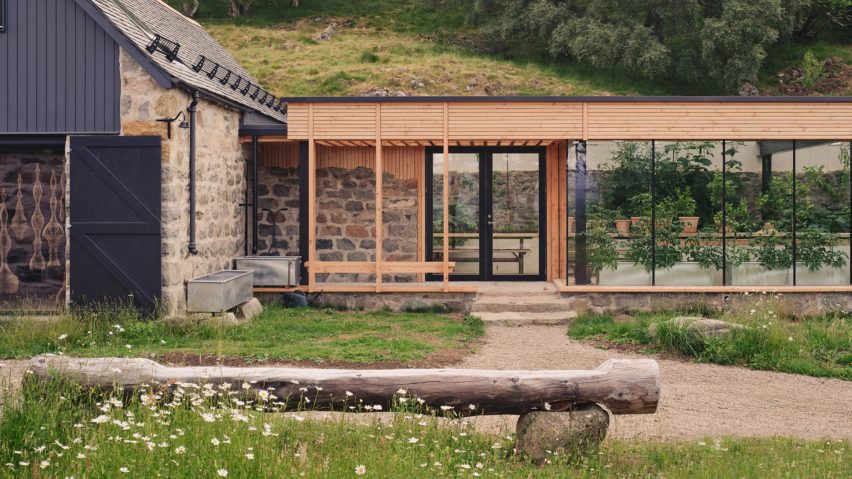British studio Moxon Architects has repurposed a small cluster of 19th-century farm buildings in Aberdeenshire, Scotland, into a guesthouse, glasshouse and private artist's studio.
Built following the restoration of the owner's main house in a hillside settlement in the Cairngorms National Park, the completion of the trio of buildings marks the end of a decade-long undertaking by the studio to reoccupy the site.
According to the studio, three material choices defined the design: expressed oak in the guesthouse interior, Douglas Fir timber for the glasshouse and frameless glazing inserted into apertures throughout existing wall structures.
"It is testament to the robustness and resilience of the historic buildings that this is a project characterised by retention and repair," said Moxon Architects founder Ben Addy. "Where there are new interventions, they are modest yet highly crafted, and seek to emulate the craft, form, and rigour of the 170-year-old architectural fabric."
The L-shaped guesthouse was rebuilt from a partially collapsed cattle shed as a detached extension of the client's primary home.
A double-height living space and kitchen lie underneath an exposed hayloft roof structure, while the walls were finished with a textural clay plaster and oak joinery to disguise modern appliances.
The most ruinous building of the converted trio was the greenhouse. Remnant stone walls became a backdrop for a glazed extension which was framed with structural timber and a steel portal enclosure.
"The glasshouse does not follow a vernacular pattern, it is a new form, but it carries the same spirit [as the original building]... undertaken with great care and precision in the detail," said Addy.
To the northern edge of the glasshouse lies the artist's studio, which contains a private workshop, kitchen, wet room and storage for the designer client, Naomi Mcintosh.
Interior walls were lined with maritime pine and contrasted against a rough steel block insertion coated with phosphate and beeswax.
For both external works and internal detailing, Moxon Architects prioritised using and reusing materials sourced from across the site.
"Where the masonry has been rebuilt the stone has again come from the site itself – zero material miles," explained Addy. "Similarly, wind-blown cherry and ash from the garden has been turned to form door handles and other joinery details."
By referencing the robust material choices of the region, Moxon Architects sought to create a sense of longevity and resilience.
"Durability, in all senses, was important," said Addy. "We developed the design and details to ensure that these once derelict buildings will survive for the next two hundred years."
"Most of all, it is about continuity in the 'art of building' embodied by the existing buildings," Addy continued.
"For what are ostensibly humble vernacular structures, the precision of the original construction is remarkable… and it was important that the new parts brought forward the same sensibilities."
Founded in 2004, Moxon Architects has offices out of both London and Aberdeenshire. In 2022, the studio was awarded RIAS' Andrew Doolan Best Building in Scotland Award for their Quarry Studios project.
The photography is by Simon Kennedy.

